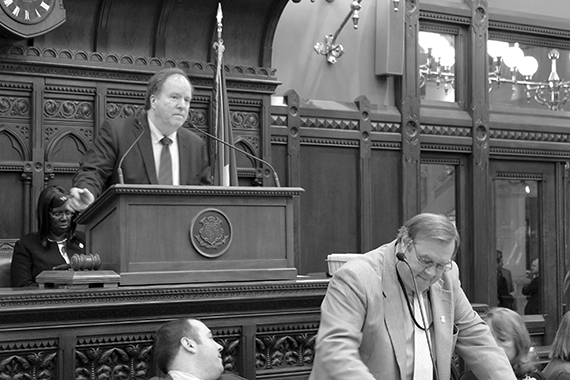
STATE REPRESENTATIVE
Kevin Ryan

Serving the 139th Assembly District
Legislative Office Building, Room 4012
Hartford, CT 06106-1591
Capitol: 800-842-8267
Kevin.Ryan@cga.ct.gov
TAX RELIEF FOR WORKING FAMILIES
FUNDING FOR VITAL SERVICES RESTORED
We worked to adopt a budget that represents the wide-ranging priorities of our diverse state, and sets us on a path that encourages continued economic growth. We passed legislation to protect hard-working, middle-class families by providing property tax relief through additional aid to our communities, and fund vital services people rely on every day.
At the time the budget was passed, it was balanced and under the spending cap. It invests in Connecticut’s transportation infrastructure, which is critical to our future economy. By investing in transportation projects, such as, roads, bridges, and ports, we encourage smart growth, address traffic congestion, and bring sustainable jobs home to Connecticut.
WHO PAYS LESS?
Most car owners will see a cut in their motor vehicle tax beginning next year as we capped the car tax mill rate statewide at 32 mills for July 2016 and 29.36 mills in July 2017. No one’s car tax will surpass these rates under this plan.
In addition, increased state aid for every city and town will allow municipalities to lower their mill rates. Private colleges that own off-campus property, and larger non-profit hospitals that buy property, will begin to contribute to a town’s tax base to help pay for services they use such as fire, police, and public works. This lessens the property tax burden currently borne solely by families and small businesses in our communities. Towns with a larger number of tax-exempt properties (e.g. state property, churches, colleges and hospitals) receive additional aid for further property tax relief as well.
Military veterans’ retirement pay will now be 100% exempt from the state income tax.
WHO PAYS MORE?
Only those earning more than $500,000 and $1 million a year will see a slight increase in their income tax rate. This impacts about 20,000 households out of CT’s 1.5 million, or the top 1.3%. We are closing tax loopholes that currently allow Connecticut corporations with profits out of state or overseas to avoid paying their fair share of taxes.
MAKING TOUGH DECISIONS
Essential funding for families that need it most is protected. Over the next two years, we will see more than a billion dollars in cuts made to the current services biennium budget. The General Fund’s spending growth is under 4%, and millions will be saved through reductions in state employee workers’ compensation costs and the cancelling of overtime.
GIVING TOWNS MORE SAY IN SCHOOL BUDGETS
Since the state first implemented a Minimum Budget Requirement (MBR), school enrollment numbers have steadily declined. The rigid requirement that towns spend the same amount (or more) on education than they did the year before was creating a disincentive for towns to deliver education efficiently and collaboratively. This year, we offered flexibility to towns with low rates of poverty that are experiencing declining enrollment. These towns can now set an education budget down to 3% below their MBR. The top 10% of our state’s highest performing districts are now exempt from MBR; all other schools that are not in an Alliance District will be allowed to go up to 1.5% below their MBR. Our state’s lowest performing schools, those designated as Alliance Districts, are not allowed to reduce their MBR.COLLEGE AFFORDABILITY
Student loan debt is an issue that impacts many Connecticut families. Sixty-four percent of college graduates in our state have student loan debt. This year, Connecticut became the first state in the nation to create a Student Loan Bill of Rights, which establishes an Office of the Student Loan Ombudsman. This office will regulate student loan servicers, compile data on borrower complaints, develop a financial literacy education course for students, and will help student borrowers and their parents navigate the loan process. In addition, the Connecticut Higher Education Supplemental Loan Authority (CHESLA) took historic steps toward increasing college affordability by announcing that it will offer its lowest fixed interest rate yet at 4.95%, down from its current rate of 6.75%. This rate is also significantly lower than the Federal PLUS loan rate of 6.84%. Visit CHESLA.ORG for more information.
RESTORING FARMLAND
Invasive species and poor conservation plans and efforts can lead to a deterioration of Connecticut’s natural resources. This year, we encouraged the conservation and preservation of farmland by requiring the state to reimburse farmers for the cost of developing, implementing, and complying with a farm resources management plan or a farmland restoration plan. We also expanded the items reimbursable to farmers under the farmland restoration program, which encourages farmers to restore farmland that has gone out of production. We increased the maximum reimbursement under the program for management or restoration plans for certain state or municipal lands, while expanding what can now be included in the restoration programs. The State Department of Agriculture’s commissioner must approve of the management or restoration plans for it to be reimbursable.
PROTECTING LONG ISLAND SOUND
Long Island Sound remains one of our most precious state resources. To protect the Sound, the “Blue Plan” will inventory the resources, uses and conservation areas of our portion of Long Island Sound. With this new plan in place, the Department of Energy and Environmental Protection along with the newly established 16-member Long Island Sound Resource and Use Inventory and Blue Plan Advisory Committee will be able to more clearly and effectively manage our offshore waters through data-driven processes. It will also help streamline, allocate and coordinate our resources, including state agencies, academic institutions, and other stakeholders. Plans similar to this have been instituted by a number of our neighboring coastal states with great success.
PROTECTING ELECTRIC CONSUMERS
This year, the state legislature took a historic step in protecting Connecticut residents, particularly the elderly, from certain practices by electricity retailers. Electric retailers can no longer enter into variable rate contracts with customers or automatically renew those contracts. Electric providers must also conform with existing laws that require proper notification to go out to their customers who have contracts expiring.
FORECLOSURE MEDIATION
The Foreclosure Mediation Program has provided vital services to consumers and helping many families avoid foreclosure. This year we extended the sunset date of the Foreclosure Mediation program to July 2019, ensuring that this essential program can continue to function and serve more Connecticut residents.
HEALTH CARE COVERAGE DENIALS REVIEW
When a health insurance carrier denies coverage, sometimes it’s because they don’t have sufficient information. A new law requires health carriers to offer the patient’s health care professional an opportunity for a conference with a clinical peer employed by the carrier when a denial is issued. A clinical peer is a physician or health care professional who holds a license in a similar specialty to one who would normally manage the medical service being reviewed.


.jpg)